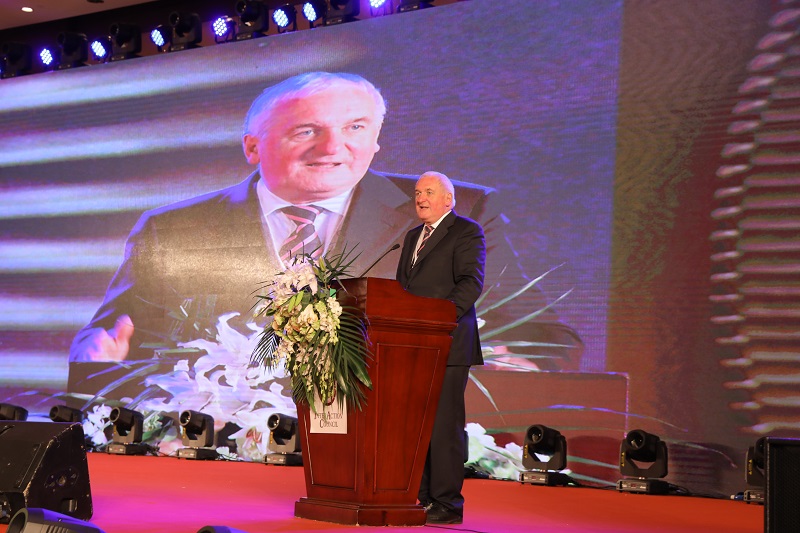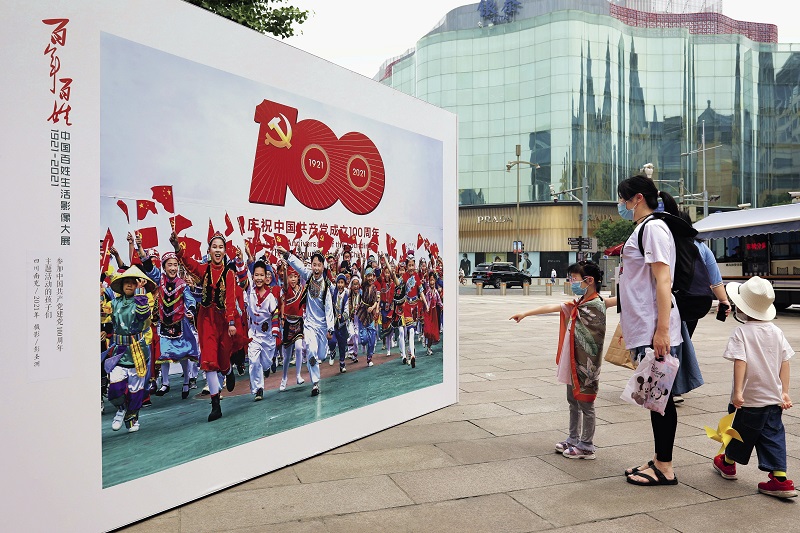If we think back to the China of some 70 years ago, it was the heir to one of the greatest civilizations in world history, but it was also a country that had endured unspeakable tragedies from foreign invasion, civil war, famine, and economic decline. Today, China is a leader in the global economy, it has pulled hundreds of millions of its citizens from grinding poverty, it has municipal and transportation infrastructure that is the envy of the world, and it is so technologically advanced that the country is now a genuine space power. Few countries have made such a rapid advance in so short a time.

Bertie Ahern addressing the 35th annual plenary meeting of the InterAction Council in September 2018 in Beijing.
I am proud to say that I was a leader who recognized early on that a Chinese renaissance was underway. In 1994, when I became leader of my party Fianna Fáil, I sent a delegation from my party to meet with the Chinese leadership to begin building a partnership for the future. Then in 1998, when I became Taoiseach or Prime Minister of Ireland, I continued down the road discussed in the earlier informal meetings by paying an official visit to China, the first of its kind by a European leader in many years. Premier Zhu Rongji and a large delegation responded to my official visit by visiting Ireland in 1999 and a very successful trading relationship followed. In 2004, when I was President of the European Council, I worked with Premier Wen Jiabao towards promoting China’s trade relations with the EU, and since that time both Ireland’s and Europe’s relationship with China has continued to grow.
When I left Parliament in 2011, my engagement with China, if anything, intensified. I became co-chair of the European ECO Forum Global International Advisory Council and visited China several times a year meeting local, state, and national leaders. I especially developed a close relationship with Hainan, including Hainan Airlines. I encouraged it to develop connectivity with Ireland and the United Kingdom.
But perhaps my greatest engagement recently has been through the InterAction Council, an organization of former world leaders that has been operating as a global thinktank since 1983. Right from its start, the InterAction Council, led by leaders like Helmut Schmidt of Germany, Takeo Fukuda of Japan, Pierre Trudeau of Canada, Malcolm Fraser of Australia, and Henry Kissinger from the United States, argued for a cooperative relationship with China, a position I endorsed and promoted when I became co-chair of the Council. The Council held its annual plenary meetings in Tianjin in 2012 and Beijing in 2018 where we met with the senior leadership of China to discuss the global agenda. In these meetings, we have benefited considerably from the expert counsel of Hong Kong’s first Chief Executive Tung Chee-hwa.

A photo exhibition on the great changes of Chinese people’s daily life over the past 100 years kicks off in Wangfujing Pedestrian Street, an iconic commercial zone in Beijing. The exhibition is a move to commemorate the centenary of the founding of the Communist Party of China.
As co-chair of this global think tank, I have encouraged the experts of the InterAction Council to form joint groups with their Chinese colleagues to study key problems: two of the most important areas for collaboration are about better preparing for global health emergencies (the Council has recently released the Dublin Charter for One Health) and concrete steps for international cooperation to fight climate change (where China has led with its concept of an ecological civilization). The Council stands ready to cooperate with Chinese partners in every phase of its work.
Both when I was in office and subsequently, I have had the opportunity to meet with hundreds of Chinese leaders and officials at every level of government. What conclusions have I drawn to explain the remarkable progress China has made during my lifetime? First, China is the world’s oldest living civilization stretching back to the Shang Dynasty in the Yellow River valley from 1600 BC to the invention of writing in Chinese characters on oracle bones about 1400 BC, to the Qin Dynasty, China’s first unified state founded in 221 BC. Empires come and go — Egypt, Babylon, Rome, the Ottomans, Napoleonic France, Victorian Britain — but only China has remained a major force throughout recorded history. Chinese leaders and officials are well aware of this long history.
When the leaders from the InterAction Council met Vice President Wang Qishan at the 35th plenary in Beijing in 2018, the Vice President not only discussed trade and foreign relations but also engaged the IAC leaders in a dialogue about the meaning of civilization, contrasting the role of religion in the West with the very different evolution of China’s governing traditions. Historical knowledge like this matter, as it gives perspective and context to today’s events. There is nothing that China has not seen (or endured) at one point or other in their ancient history. This in turn has formed one of the characteristics that has made China such a modern success — Chinese leaders plan for the long haul. Chinese civilization has thrived for 4,000-5,000 years, so the Chinese leadership is supremely confident in their ability to make decisions for the long-term good of their citizens. When Chinese officials briefed me on their plans to reduce carbon emissions, or install high-speed rail, or excel at a technology like artificial intelligence by putting into place actions today that will have impact on a generation hence, one cannot help but be impressed especially in contrast with our propensity to make economic decisions based on a time frame of the next quarter or political decisions based on a four-year parliamentary term.
Another characteristic of the Chinese governance system that I find contributes to the vitality of China’s progress is the competitive nature of the Chinese system of state and local government. I have had meetings in almost every region of China and everywhere I have found officials and local leaders enthusiastically promoting their city or town, creating incredible dynamism at China’s grassroots. The national government must have a difficult job in sorting out these competing demands and allocating resources, but it is far better to have ideas and projects constantly bubbling up from below than to follow a preordained course of action. For millennia the Chinese people have been industrious and entrepreneurial, and I have seen that this characteristic continues among the many local leaders that I have had the pleasure to meet.
In addition to enthusiasm, I have also noticed the superior training that many Chinese officials have received. It is not uncommon to discover that many of the local decision makers have studied abroad, not least in my home country of Ireland where the Ireland China Friendship Association is very strong and where I have addressed many Chinese students studying in Ireland. I think all my colleagues in the InterAction Council have found a similar situation — Chinese students well trained in China but desirous of learning from others and teaching others about China in turn. China invented the concept of a professional meritocratic public service system in the Sui Dynasty (581-618), in which people could only gain a rank by taking exams. It is a tradition that has endured and continues to benefit China.
In the 70-strong years since the People’s Republic of China was founded in 1949 and in the 40-odd years since the country kicked off its reform and opening-up in 1978, China has made the most amazing economic advance in modern times. In 1949, the People’s Republic of China was denied its legitimate seat in the United Nations, today it is on the UN’s Security Council and is a significant player on every major issue on the global agenda. The world hopes that China will make as great a contribution to the solution of world problems as it has already made to the solution of its domestic problems. The philosopher Lao Tzu said that “A journey of a thousand miles begins with a single step.” In the last several decades, China’s pace has quickened in its age-long journey to provide peace, harmony, and prosperity to its citizens. It is a record to be proud of, and in the 21st century to come we hope that China continues its peaceful advance.
BERTIE AHERN is former prime minister of Ireland and co-chair of the InterAction Council.